Search
Recent comments
- RC into A....
1 hour 6 min ago - destabilising....
2 hours 10 min ago - lowe blow....
2 hours 42 min ago - names....
3 hours 19 min ago - sad sy....
3 hours 44 min ago - terrible pollies....
3 hours 54 min ago - illegal....
5 hours 6 min ago - sinister....
7 hours 28 min ago - war council.....
17 hours 13 min ago - flying saucers....
17 hours 24 min ago
Democracy Links
Member's Off-site Blogs
murder by drone ....
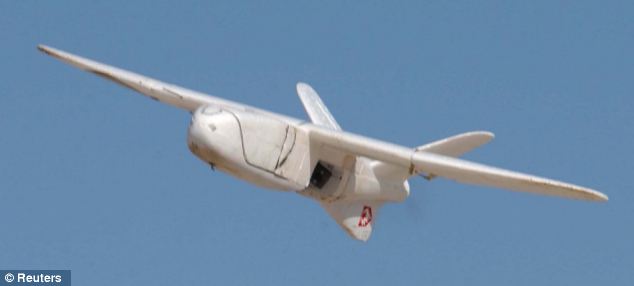
A damning dossier assembled from exhaustive research into the strikes’ targets sets out in heartbreaking detail the deaths of teachers, students and Pakistani policemen. It also describes how bereaved relatives are forced to gather their loved ones’ dismembered body parts in the aftermath of strikes.
The dossier has been assembled by human rights lawyer Shahzad Akbar, who works for Pakistan’s Foundation for Fundamental Rights and the British human rights charity Reprieve.
Filed in two separate court cases, it is set to trigger a formal murder investigation by police into the roles of two US officials said to have ordered the strikes. They are Jonathan Banks, former head of the Central Intelligence Agency’s Islamabad station, and John A. Rizzo, the CIA’s former chief lawyer. Mr Akbar and his staff have already gathered further testimony which has yet to be filed.
‘We have statements from a further 82 victims’ families relating to more than 30 drone strikes,’ he said. ‘This is their only hope of justice.’
In the first case, which has already been heard by a court in Islamabad, judgment is expected imminently. If the judge grants Mr Akbar’s petition, an international arrest warrant will be issued via Interpol against the two Americans.
The second case is being heard in the city of Peshawar. In it, Mr Akbar and the families of drone victims who are civilians are seeking a ruling that further strikes in Pakistani airspace should be viewed as ‘acts of war’.
They argue that means the Pakistan Air Force should try to shoot down the drones and that the government should sever diplomatic relations with the US and launch murder inquiries against those responsible.
According to a report last month by academics at Stanford and New York universities, between 2,562 and 3,325 people have been killed since the strikes in Pakistan began in 2004.
The report said of those, up to 881 were civilians, including 176 children. Only 41 people who had died had been confirmed as ‘high-value’ terrorist targets.
Getting at the truth is difficult because the tribal regions along the frontier are closed to journalists. US security officials continue to claim that almost all those killed are militants who use bases in Pakistan to launch attacks on Western forces across the border in Afghanistan.
In his only acknowledgement that the US has ever launched such attacks at all, President Barack Obama said in January: ‘This is a targeted, focused effort at people who are on a list of active terrorists, who are trying to go in and harm Americans.’
But behind the dry legal papers seen by The Mail on Sunday lies the most detailed investigation into individual strikes that has yet been carried out. It suggests that the US President was mistaken.
Missile attacks in in Pakistan have had devastating affects, the dossier revealed.
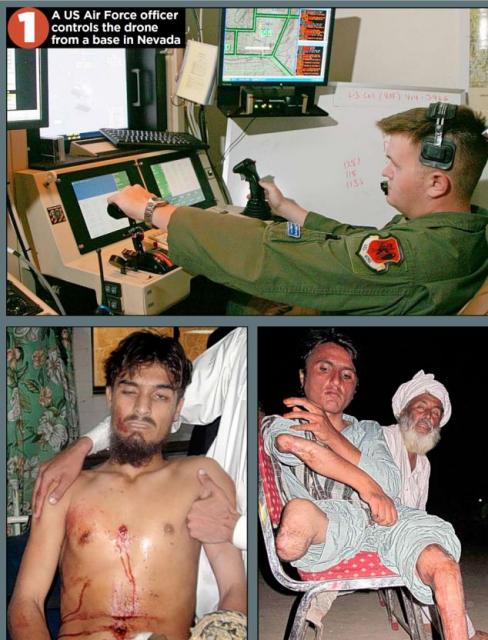
In another statement – one of 13 taken by Mr Akbar concerning the Datta Khel strike – driver Ahmed Jan, 52, describes the moment the missile hit: ‘We were in the middle of our discussion and I was thrown about 24ft from where I was sitting. I was knocked unconscious. When I awoke, I saw many individuals who were injured or dead.
‘I have lost the use of one of my feet and have a rod inserted because of the injuries. It is so painful for me to walk. There are scars on my face because I had to have an operation on my nose when it would not stop bleeding.’
Mr Jan says he has spent £3,600 on medical treatment but ‘I have never been offered compensation of any kind I do not know why this jirga was targeted. I am a malik [elder] of my tribe and therefore a government servant. We were not doing anything wrong or illegal.’
Another survivor was Mohammed Noor, 27, a stonemason, who attended the jirga with his uncle and his cousin, both of whom were killed. ‘The parts of their bodies had to be collected first. These parts were all we had of them,’ he said.
Mr Akbar said that fighting back through the courts was the only way ‘to solve the larger problem’ of the ongoing terrorist conflict.
‘It is the only way to break the cycle of violence,’ he said. ‘If we want to change the people of Waziristan, we first have to show them that we respect the rule of law.’
A senior CIA officer said: ‘We do not discuss active operations or allegations against specific individuals.’ A White House source last night declined to comment.
US Drone Attacks - CIA Chiefs Face Arrest - Horrific Evidence Bloody Video Game Sorties
The plaintiff in the Islamabad case is Karim Khan, 45, a journalist and translator with two masters’ degrees, whose family comes from the village of Machi Khel in the tribal region of North Waziristan.
His eldest son, Zahinullah, 18, and his brother, Asif Iqbal, 35, were killed by a Hellfire missile fired from a Predator drone that struck the family’s guest dining room at about 9.30pm on New Year’s Eve, 2009.
Asif had changed his surname because he loved to recite Iqbal, Pakistan’s national poet, and Mr Khan said: ‘We are an educated family. My uncle is a hospital doctor in Islamabad, and we all work in professions such as teaching.
‘We have never had anything to do with militants or terrorists, and for that reason I always assumed we would be safe.’
Mr Khan said: ‘Zahinullah, who had been studying in Islamabad, had returned to the village to work his way through college, taking a part-time job as a school caretaker.
‘He was a quiet boy and studious – always in the top group of his class.’ Zahinullah also liked football, cricket and hunting partridges.
Asif, he added, was an English teacher and had spent several years taking further courses to improve his qualifications while already in work.
Mr Khan said: ‘He was my kid brother. We used to have a laugh, tell jokes.’ His first child was less than a year old when Asif was killed.
Included in the legal dossier are documents that corroborate Asif and Zahinulla’s educational and employment records, as well as their death certificates. Killed alongside them was Khaliq Dad, a stonemason who was staying with the family while he worked on a local mosque.
Mr Khan, who had been working for a TV station in Islamabad, said he was given the news of their deaths in a 2am phone call from a cousin.
Drones have caused untold damage, and the dossier reveals just how devastating they have been for families
‘I called a friend who had a car and we started driving through the night to get back to the village,’ he said. ‘It was a terrible journey. I was shocked, grieving, angry, like anyone who had lost their loved ones.’
He got home soon after dawn and describes his return ‘like entering a village of the dead – it was so quiet. There was a crowd gathered outside the compound but nowhere for them to sit because the guest rooms had been destroyed’.
Zahinullah, Mr Khan discovered, had been killed instantly, but despite his horrific injuries, Asif had survived long enough to be taken to a nearby hospital. However, he died during the night.
‘We always bury people quickly in our culture. The funeral was at three o’clock that afternoon, and more than 1,000 people came,’ Mr Khan said. ‘Zahinullah had a wound on the side of his face and his body was crushed and charred. I am told the people who push the buttons to fire the missiles call these strikes “bug-splats”.
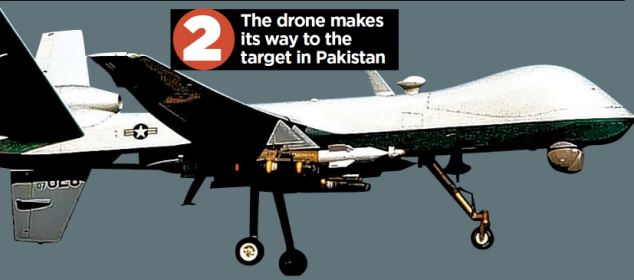
‘It is beyond my imagination how they can lack all mercy and compassion, and carry on doing this for years. They are not human beings.’
Mr Khan found Mr Akbar through a friend who had attended lectures he gave at an Islamabad university. In 2010, he filed a criminal complaint – known as a first information report – to police naming Mr Banks. However, they took no action, therefore triggering the lawsuit – a judicial review of that failure to act.
If the judge finds in favour of Mr Khan, his decision cannot be appealed, thus making the full criminal inquiry and Interpol warrants inevitable.
According to the legal claim, someone from the Pakistan CIA network led by Mr Banks – who left Pakistan in 2010 – targeted the Khan family and guided the Hellfire missile by throwing a GPS homing device into their compound.
Mr Rizzo is named because of an interview he gave to a US reporter after he retired as CIA General Counsel last year. In it, he boasted that he had personally authorised every drone strike in which America’s enemies were ‘hunted down and blown to bits’.
He added: ‘It’s basically a hit-list . . . The Predator is the weapon of choice, but it could also be someone putting a bullet in your head.’
Last night a senior Pakistani security official, speaking on the condition of anonymity, said that Pakistan’s own intelligence agency, the ISI, has always been excluded by the CIA from choosing drone targets.
‘They insist on using their own networks, paying their own informants. Dollars can be very persuasive,’ said the official.
He claimed the intelligence behind drone strikes was often seriously flawed. As a result, ‘they are causing the loss of innocent lives’.
But even this, he added, was not as objectionable as the so-called ‘signature strikes’ – when a drone operator, sitting at a computer screen thousands of miles away in Nevada, selects a target because he thinks the drone camera has spotted something suspicious.
He said: ‘It could be a vehicle containing armed men heading towards the border, and the operator thinks, “Let’s get them before they get there,” without any idea of who they are.
‘It could also just be people sitting together. In the frontier region, every male is armed but it doesn’t mean they are militants.’
One such signature strike killed more than 40 people in Datta Khel in North Waziristan on March 17 last year. The victims, Mr Akbar’s dossier makes clear, had gathered for a jirga – a tribal meeting – in order to discuss a dispute between two clans over the division of royalties from a chromite mine.
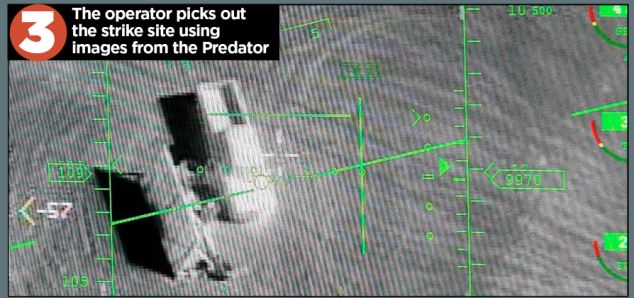
Some of the most horrifying testimony comes from Khalil Khan, the son of Malik Haji Babat, a tribal leader and police officer. ‘My father was not a terrorist. He was not an enemy of the United States,’ Khalil’s legal statement says. ‘He was a hard-working and upstanding citizen, the type of person others looked up to and aspired to be like.’
Khalil, 32, last saw his father three hours before his death, when he left for a business meeting in a nearby town. Informed his father had been killed, Khalil hurried to the scene.
‘What I saw when I got off the bus at Datta Khel was horrible,’ he said. ‘I immediately saw flames and women and children were saying there had been a drone strike. The fires spread after the strike.
‘I went to the location where the jirga had been held. The situation was really very bad. There were still people lying around injured.
‘The tribal elders who had been killed could not be identified because there were body parts strewn about. The smell was awful. I just collected the pieces that I believed belonged to my father and placed them in a small coffin.’
Khalil said that as a police officer, his father had earned a good salary, on which he supported his family. Khalil has considered returning to the Gulf, where he worked for 14 years, but ‘because of the frequency of drones I am concerned to leave my family’.
He added that schools in the area were empty because ‘parents are afraid their children will be hit by a missile’.
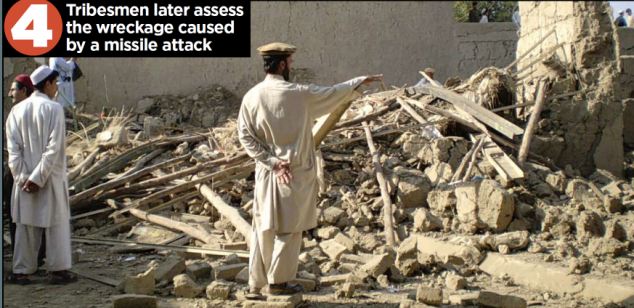
In another statement – one of 13 taken by Mr Akbar concerning the Datta Khel strike – driver Ahmed Jan, 52, describes the moment the missile hit: ‘We were in the middle of our discussion and I was thrown about 24ft from where I was sitting. I was knocked unconscious. When I awoke, I saw many individuals who were injured or dead.
‘I have lost the use of one of my feet and have a rod inserted because of the injuries. It is so painful for me to walk. There are scars on my face because I had to have an operation on my nose when it would not stop bleeding.’
Mr Jan says he has spent £3,600 on medical treatment but ‘I have never been offered compensation of any kind I do not know why this jirga was targeted. I am a malik [elder] of my tribe and therefore a government servant. We were not doing anything wrong or illegal.’
Another survivor was Mohammed Noor, 27, a stonemason, who attended the jirga with his uncle and his cousin, both of whom were killed. ‘The parts of their bodies had to be collected first. These parts were all we had of them,’ he said.
Mr Akbar said that fighting back through the courts was the only way ‘to solve the larger problem’ of the ongoing terrorist conflict.
‘It is the only way to break the cycle of violence,’ he said. ‘If we want to change the people of Waziristan, we first have to show them that we respect the rule of law.’
A senior CIA officer said: ‘We do not discuss active operations or allegations against specific individuals.’ A White House source last night declined to comment.
US Drone Attacks - CIA Chiefs Face Arrest - Horrific Evidence Bloody Video Game Sorties
- By John Richardson at 23 Oct 2012 - 7:48am
- John Richardson's blog
- Login or register to post comments
droning on...
It was something both candidates could agree on. Near the end of the last debate between President Barack Obama and his opponent Mitt Romney on Monday, moderator Bob Schieffer asked the Republican presidential candidate where he stood on the U.S.’s “use of drones.” Romney voiced his support for the President’s ongoing policy of using unmanned weapons to attack terrorist targets, saying the U.S. should be ready by “any and all means necessary to take out people who pose a threat to us and our friends around the world.” In a conversation that ranged from U.S. education to trade with China, Obama and Romney saw eye to eye on a several foreign policy points, but none generated as little debate as the Obama Administration’s increased dependence on drone technology, which has proved to be such a nonissue in this presidential race that it merited only a few words from Romney, and none at all from the sitting President.
But if Schieffer were to bring up drones among politicians in Islamabad today, a few more sparks might fly. The U.S. has been using drones to target parts of the country that lie on the border with Afghanistan since 2004 in an ongoing campaign to root out militants working against U.S. troops and interests. Many in Pakistan say that its governments in the past eight years have been complicit in — if not covertly supportive of — the campaign, if simply by dint of the fact that it has not taken up what’s a clear breach of sovereignty with any international legal body. Most of the drone strikes take place in parts of Pakistan that are both physically and socially remote from the rest of the country. Few journalists have been permitted to go into these specially administered areas to see what the drones do firsthand, and while compiled reports from groups like the nonprofit Bureau of Investigative Journalism put the total number of people killed in drone strikes as high as 3,365, including 176 children, these figures have been questioned by parties both inside and outside Pakistan in the absence of official data from either government.
Read more: http://world.time.com/2012/10/23/drones-a-non-issue-in-u-s-presidential-debate-riles-pakistan/#ixzz2ACRxiolB
playing god .....
The man in charge of America’s drone wars will face Senate questioning about perhaps their most controversial aspect: when the president can target American citizens for death.
Sen. Ron Wyden (D-Ore.) sent a letter on Monday to John Brennan, the White House’s counterterrorism adviser and nominee to be head of the CIA, asking for an outline of the legal and practical rules that underpin the U.S. government’s targeted killing of American citizens suspected of working with al-Qaida. The Obama administration has repeatedly resisted disclosing any such information about its so-called “disposition matrix” targeting terrorists, especially where it concerns possible American targets. Brennan reportedly oversees that matrix from his White House perch, and would be responsible for its execution at CIA director.
“How much evidence does the President need to determine that a particular American can be lawfully killed?” Wyden, a member of the Senate intelligence committee, asks in the letter, acquired by Danger Room. “Does the President have to provide individual Americans with the opportunity to surrender before killing them?”
Wyden’s questions about the targeted-killing effort get specific. He wants to know how the administration determines when it is “not feasible” to capture American citizens suspected of terrorism; if the administration considers its authority to order such killings inherent in its Constitutional war powers or embedded in the 2001 Authorization to Use Military Force; and if the intelligence agencies can “carry out lethal operations inside the United States.” Wyden also expresses “surprise and dismay” that the intelligence agencies haven’t provided him with a complete list of countries in which they’ve killed people in the war on terrorism, which he says “reflects poorly on the Obama administration’s commitment to cooperation with congressional oversight.”
Thus far, senators on the intelligence panel have been more concerned about Brennan’s possible role in national-security information leaks and the CIA’s post-9/11 torture program than in using Brennan’s nomination to peer into the decision-making surrounding Obama’s counterterrorism strikes. Wyden writes that it is “critically important” for Congress to understand “how the executive branch understands the limits and boundaries of this authority.”
In September 2011, a U.S. missile strike in Yemen killed Anwar al-Awlaki, al-Qaida’s most prominent English-language propagandist and an American citizen. Weeks later, another strike fired by a U.S. drone killed Awlaki’s 16-year old son, Abdulrahman.
The Obama administration has never disclosed the evidence behind its claims that the elder Awlaki posed such an imminent danger to Americans that prompted killing him without due process of law, prompting a major debate about the legality of the killing. (Administration officials have said even less about the justification for killing the 16-year old Abdulrahman al-Awlaki.) Members of the Awlaki family, the New York Times and the American Civil Liberties Union have variously sued the government for additional information about the strikes, all unsuccessfully. Earlier this month, a federal judge in New York ruled that the government was not required to disclose the legal analysis undergirding the Awlaki targeting decisions, even as the judge herself blasted the administration for embracing “certain actions that seem on their face incompatible with our Constitution and laws, while keeping the reasons for their conclusion a secret.”
Wyden doesn’t specifically ask for information about the killing of Awlaki and his son. He’s after the more general rules embraced by the administration about when killing a U.S. citizen is permissible in the U.S. shadow wars. Those rules, apparently written in 2010 by Justice Department lawyers David Barron and Marty Lederman, were described in a New York Times piece but remain secret. Wyden doesn’t ask for their disclosure, just for the administration to permit members of the intelligence panel to read them.
“For the executive branch to claim that intelligence agencies have the authority to knowingly kill American citizens but refuse to provide Congress with any and all legal opinions that explain the executive branch’s understanding of this authority represents an alarming and indefensible assertion of executive prerogative,” Wyden writes.
As the Senate intelligence panel’s leading civil libertarian, Wyden frequently calls on the administration to explain the classified reasoning behind its most controversial national security practices. He’s accused the administration of adopting a private interpretation of the Patriot Act so expansive, for instance, that it amounts to “secret law” authorizing surveillance. Most often the administration stiffs Wyden. The National Security Agency has yet to disclose how many Americans are caught up in its dragnet for terrorist communications, one of Wyden’s major preoccupations, telling the Senator that even disclosing that number would violate Americans’ privacy.
Brennan remains likely to receive Senate approval for his CIA nomination. But until now, senators on the panel that will handle his confirmation had seemed less than interested in exploring the more discomforting aspects of the counterterrorism strategy colloquially referred to as the “drone war.”
Wyden doesn’t endorse or reject Brennan for the top CIA job. Wyden spokesman Tom Caiazza tells Danger Room that ”the senator is looking forward to a frank and substantive conversation on these issues and of course the results will be considered in his decision making.”
Senator Asks CIA Nominee When Drones Can Kill Americans